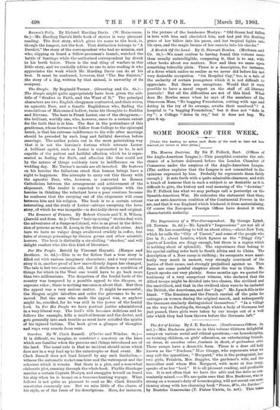The Steeple. By Reginald Turner. (Greening and Co. 6s.)— ,The
Steeple might quite appropriately have been given the sub- title of " Studies in Faith, and the Want of It." The principal characters are two English clergymen contrasted, and their wives, an agnostic Peer, and a fanatic. Englishman who, finding the consolations of Mahommed hollow, turns his thoughts to Buddha and Nirvana. The hero is Frank Lester, one of the clergymen,— the brilliant, worldly one, who, however, cares to a certain extent for the faith that is in him. The flaw in the portraiture of this gentleman, whose fortunes we follow from College to the episcopal bench, is that his extreme indifference to his wife after marriage should be preceded by such long and faithful devotion before marriage. The author points out in the most painstaking way that it is not the heroine's fortune which attracts Lester. A brilliant egoist, such as Lester is represented to be, is not capable of the patient and faithful affection which he is repre- sented as feeling for Ruth, and affection like that could not by the nature of things suddenly turn to indifference on the wedding day. Mr. Turner's morals are all inverted. He bestows on his heroine the fallacious creed that human beings have a right to happiness. She attempts to carry out this theory with the agnostic Peer, who, however, is converted to Roman Catholicism between the arrangement and achievement of the , elopement. The reader is expected to sympathise with the heroine in thinking the reluctant lover a poor creature because he confesses that the carrying out of the elopement will come between him and his religion. The book is to a certain extent interesting, and the study of Lester—always excepting the love- story, of which he was incapable—is decidedly clever and original. . The Romano., of Poisons. By Robert Cromie and T. S. Wilson. (Jarrold and Sons. 6s.)—These "hair-upzaising" stories deal with the adventures of a Surgeon-Colonel, who is as great in the detec- tion of poisons as was M. Lecoq in the detection of all crime. And here we have no vulgar drugs swallowed crudely in coffee, but tales of strange poisonings by disease germs and other scientific horrors. The book is distinctly a six-shilling "shocker," and will -delight readers who like this kind of literature.










































 Previous page
Previous page